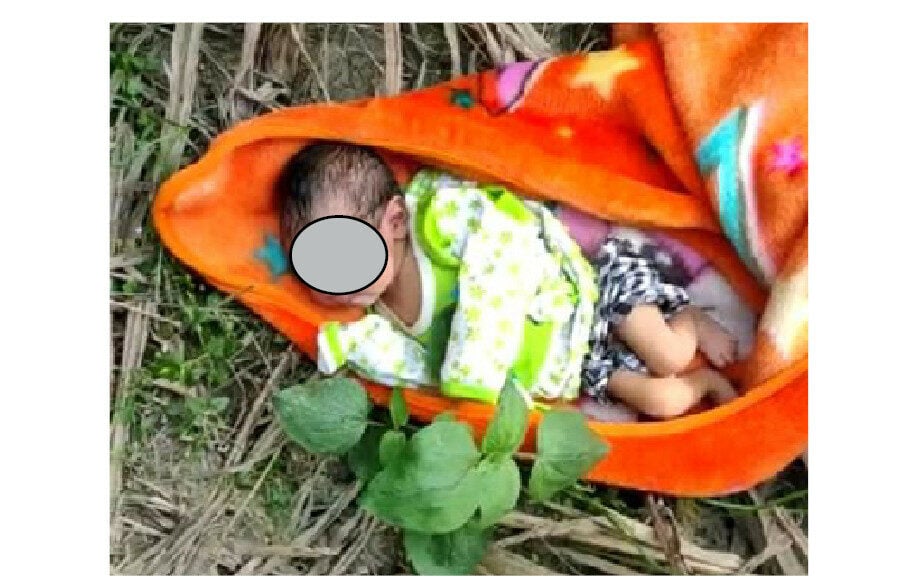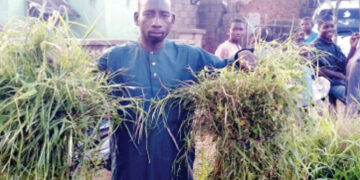Across the country, from the bustling streets of Lagos to the farmlands of Benue, from the creeks of the Niger Delta to the outskirts of Kano, cases of child abandonment are rising at an alarming rate. In many instances, these children are discovered barely clinging to life, wrapped in rags or plastic bags, discarded like waste.
While teenage pregnancies once dominated the narrative of abandonment, the crisis has worsened to the point where even married couples, particularly in Rivers State , driven by joblessness, hunger, and hopelessness, are leaving behind their offspring in a desperate cry for help.
LEADERSHIP Sunday reports that the worsening economic landscape has created a harsh reality where basic survival eclipses parental instinct. With inflation soaring, unemployment rampant, and social safety nets almost non-existent, many parents, especially mothers , are pushed beyond their breaking point. The act of abandonment, while indefensible, is often the tragic result of systemic failure and a nation struggling to care for its most vulnerable. And while each abandoned child tells a story of pain, each act is also a mirror to a society in distress.
While it’s true that the nation’s economy is biting harder than ever, one cannot help but ask: is it truly justifiable for a mother who carried a child for nine long months to abandon that child without a second thought about the dangers that await? In a country where kidnappers, ritualists, and organ harvesters are said to be lurking in every corner, how can a mother walk away, knowing the unimaginable risks her child may face?
In a recent heart-wrenching incident, Apostle Chibuzor Chinyere, founder of the Omega Power Ministries (OPM) in Port Harcourt, raised a heartbreaking alarm that he had to turn away two abandoned children brought to his church.

He disclosed that unable to take them in due to limited capacity, he directed that they be taken to the Special Area Police Division in Rumuokoro, Port Harcourt. There, their father eventually came forward, explaining that their mother had left them behind, unable to cope with the crushing weight of economic hardship.
The OPM founder stated during his revelation that his Ministry has long been a beacon of hope for abandoned and underprivileged children, running several free schools and offering full scholarships up to university level. The cleric however added that despite this, the burden is overwhelming
Apostle Chinyere, who is currently housing over 500 children in his personal residence, says this is not the first time he has found children dumped at his doorstep. With tears in his voice, he pleaded for greater societal and governmental support because faith alone is no longer enough to carry the growing weight of a nation’s abandoned future.
His voice trembled with sorrow as he revealed that even religious institutions, once the final refuge for the forsaken, are now overwhelmed by the sheer number of cases.
Many residents, who listened to his disclosure described the action as “ a tragedy unfolding before our very eyes. One that pierces the soul and calls out for urgent intervention.”
It’s no longer news that children abandoned on the streets often referred to as street children, are among the most vulnerable members of society. They face unimaginable risks daily such as exploitation by traffickers, physical and sexual violence, hunger, sickness, and a complete lack of access to education or healthcare. These are not just statistics, they are children, left to survive in a world that seems to have turned its back on them.
When LEADERSHIP Sunday went around the streets of Port Harcourt, it observed a grim reality. Apart from the efforts of Omega Power Ministries (OPM), no other religious organisation in the city appears to offer a permanent safe haven for abandoned children. While some churches and other religious centers occasionally organise charity events or outreach programmes to support less privileged children, there is a glaring absence of consistent, structured care. This gap has contributed to the alarming rise in the number of homeless children who now take refuge in motor parks, under bridges, abandoned vehicles, or derelict buildings.
By day, many of these children hustle to survive running errands, washing plates in restaurants and eateries, or helping out in markets. At night, they retreat to makeshift shelters, often curling up on shop verandas, empty market tables, or inside broken-down buses, waking up at dawn to avoid detection by business owners.
Some women who spoke with our correspondent expressed deep concern, revealing that this dangerous street lifestyle exposes the children, especially young girls to exploitation.
They said, “ Some heartless drivers, touts, and bus conductors often prey on them, using them to satisfy their sexual urges”
This, the women said, has become another major driver of the growing wave of teenage pregnancies in the city.
A cleric, who preferred not to be named in the mile 1 area said, “Absolutely, I am deeply moved by the gravity of what’s happening. It’s a tragic reflection of a society failing its most vulnerable. But sadly, I am not financially bouyant to help them out.”
Reacting to the claim by the women , a social worker and youth mentor, Mr. Samuel Obi, had this to say, “These are not just statistics, they are human beings, children, left to navigate a cruel world alone. The fact that some adults find it acceptable to sexually abuse them, through rape or even anal sex, is horrifying. It’s a moral collapse, and silence only makes us complicit.”
A mother of three and concerned citizen, Mrs Belema Ebiere, said, “Sometimes I see those children sleeping on carton boxes by the roadside, and I wonder what kind of monsters wait for the night to prey on them. It’s rape, abuse, disease, trauma, and no one is held accountable. Where is our conscience as a people?
LEADERSHIP Sunday investigation revealed that there are no fewer than nine orphanage homes in Port Harcourt, the Rivers State capital, including the Borokiri Motherless Babies Home, managed by the state Ministry of Social Welfare.
This correspondent observed that the majority of the orphanages have between 30 and 50 inmates, who rely on support from organisations and good-spirited individuals for their survival.
A child psychologist, Hilda Ndam, told LEADERSHIP Sunday that the causes of child abandonment are diverse, stemming from factors like poverty, domestic violence, abuse, family breakdown, or cultural practices, leading to vulnerable children who are often difficult to count and support.
Ndam stated that such children can suffer long-term physical and psychological impacts, including depression, trauma, and difficulty forming healthy relationships.
She said, “Extreme poverty can force children to the streets to find food or earn money for their families. Family breakdown and abuse , including domestic violence, physical, sexual, or emotional abuse and the death of parents or caregivers can lead to children being abandoned.
“Cultural factors also play a role. In some regions, children may be abandoned or sent away due to accusations of witchcraft or for bringing shame to a family through actions like refusing an arranged marriage.
“Children can be lured onto the streets by pimps, begging syndicates, or other predators. Parents’ mental health problems or substance abuse can also contribute to a child’s abandonment,” she said.
The child psychologist stated that abandoned children are likely to suffer from respiratory problems and other health issues due to their environment.
Ndam said: “Street children are vulnerable to respiratory problems and other health issues due to their environment. Many suffer from depression, anxiety, trauma, and a low sense of well-being.
“Some may engage in substance abuse or other risky behaviors as coping mechanisms. Street children are at high risk of violence and exploitation by others.
“Without intervention, the emotional scars and negative experiences of abandonment can affect children into adulthood.”
Speaking with LEADERSHIP Sunday also, a parent, Mr. Uzoma Chibueze Uwadi, said many parents abandon their children due to hardship, which can make it impossible for them to provide adequate care.
Uwadi added that societal factors, such as stigma against single parents or against children of specific genders, often contribute to such difficult decisions.
He said: “Parents abandon their children due to severe hardship, which can make it impossible to provide care. Societal factors like stigma against single parents or specific genders, and lack of social support systems, also contribute to this decision.
“Sometimes, parents may mistakenly believe that abandoning a child offers them a better chance at life, or they may simply not be equipped with the necessary parenting skills or knowledge to care for a child, especially one with specific health needs.”
When contacted by phone, the District Superintendent of the Assemblies of God Church, South, Rev. (Dr.) Kelechi Ogbonna Augustine, condemned the act of child abandonment, describing children as “precious gifts from God.”
The clergyman expressed deep sorrow over the rising cases of abandoned children, calling it both heartbreaking and inexcusable.
He said, “It’s sad that at a time when many families are paying millions for IVF treatments to conceive, others who have been freely blessed with adorable, innocent children are dropping them in pit toilets, uncompleted buildings, footpaths, and even on farmlands.”
He added: “This isn’t just about poverty or hardship, it’s about wickedness. It’s about hardened hearts and a lack of the fear of God. What’s even more disturbing is that the same individuals who are often supported by society, well-meaning individuals, and churches, go on to become pregnant or impregnate others all over again.”
Rev. Augustine noted that the church is not standing idly by. According to him, Assemblies of God churches across the region have been actively supporting members and a few others in need.
“We do our best to assist our members and their families. Whether it’s food, school fees, or counselling, we step in where we can. But this issue requires more than help. It needs true repentance and a return to God,” he stressed.
He called on those involved in child abandonment to seek forgiveness and pray for genuine transformation of heart.
Child Rights Advocate Speaks:
Also speaking, Mrs. Linda Emekajor, a child rights advocate and founder of Save the Innocents Foundation, described the trend as a national emergency requiring urgent action from both government and society.
“We’re dealing with a growing generation of children raised by the streets, traumatised, unprotected, and exposed to abuse. These children did not ask to be born, and yet they are treated like trash. It’s unacceptable,” she said.
Emekajor called for stronger government intervention, more functional safe homes, and stiffer penalties for offenders. She also emphasised the importance of public awareness, reproductive education, and psychological support for struggling parents.
“Yes, people are going through hard times, but abandoning a child should never be an option. There is always help people just need to know where to find it,” she concluded.
A Repentant Mother Speaks Out
A repentant mother, who once abandoned her newborn but pleaded not to be named, shared her deeply personal story with LEADERSHIP Subday, offering a rare glimpse into the emotional turmoil behind such a decision.
Fighting back tears, she recalled the moment that changed her life forever.
“It happened years ago when I was much younger and completely overwhelmed. I had just given birth alone, with no family support, no money, and no idea what to do. The father of the child had disappeared, and I was homeless at the time.”
She admitted that fear and shame clouded her judgment.
“I wasn’t thinking clearly. I was scared. I had no food, no diapers, nothing. In my mind, I thought someone else might find the baby and give them a better life than I could.”
The woman said she lived with guilt for years, until she found a local church that welcomed her, offered counselling, and helped her reconnect with her faith.
“Every day since then, I’ve prayed for forgiveness. I now speak to young girls in my community, telling them what I wish someone had told me, that there’s always another way, that help is out there, and that no child deserves to be abandoned.”
She told our correspondent that she now works with a women’s outreach group, providing emotional support and resources for expectant and struggling mothers.
“I can’t undo the past, but I can stop others from making the same mistake I did. If I had known then what I know now, I would have held my baby close and fought for both of us.”
I Was Lucky To Be Halted — A Mother Reflects On A Painful Past
Another woman, who gave her name simply as Mummy Ernesta, recounted her near-mistake with a mixture of gratitude and lingering guilt.
“I was lucky to have been stopped. I will forever be grateful that someone intervened,” she said quietly, reminiscing on a dark chapter of her life. “
She explained that her troubles began when her stepmother sent her away from home, unwilling to have her around her father. Desperate, she travelled to live with an aunt who was married to a strict, unwelcoming man , where she said her suffering worsened.
According to her, “I had no support. I was hungry, emotionally drained, and just trying to survive. That’s how I got entangled with a guy who was helping me. I didn’t even know I was pregnant because I was still seeing my period.”
Having written my WAEC exams and awaiting NECO, my situation came to light when observant neighbours noticed the signs and started whispering among themselves. I panicked, and ran to my biological mother, who, fearing she might lose her second marriage, refused to take me in.
Mummy Ernesta said, back at my aunt’s house, things deteriorated. My aunt would lock me out of the house for hours, leave me hungry, and ignore my pain. I even took pills to end the pregnancy, but nothing worked. It stayed.”
Then came the day of labour. I was overwhelmed and alone, and then, I made a dangerous decision. When the labour pains started, I rushed to a pit toilet with the thought of delivering the baby there. I was ready to let go but fate intervened.
“A retired matron in the area saw me sneaking off and followed. She rescued me just in time, helped deliver my baby girl, and took us both into her home.”
That woman, she said, changed her life.
“She treated me like her own child. Her children treated me like a sister. Because of her, I was able to sit for my NECO, gained admission to university, and eventually relocated to where I am now.”
“Today, my daughter is thriving. But the guilt still lingers.Every time I look at her, I feel a knot in my chest because I almost lost her, and she almost lost me. But I’m grateful to that woman ( a Cross Riverine) who saved us. She gave me a second chance.”
Speaking to LEADERSHIP Sunday , Pastor Blessing Echenwo, proprietress of Priesthood Orphanage Home in Elelenwo, Port Harcourt, identified the lack of adequate infrastructure, particularly for teenagers, as the major challenge facing most orphanage homes.
“In a situation where an 18-year-old child does not know his or her parents, how do you just push such a child back to the streets?” Echenwo asked.
She said she is also burdened by the cost of school fees, as all her “children” are now of school age, some even in tertiary institutions.
The proprietress added that she had to introduce skill acquisition and entrepreneurship programmes for the children to help them become self-reliant. Sales points and job outlets were created within their neighborhood for easy monitoring. “We had to make them very close to our location so we can monitor them from close quarters,” she explained.
Echenwo emphasised that the most important form of impartation is spiritual and moral upbringing so that the children grow up with a fear of God. “If we allow them to scatter, all the moral values we built into them would disappear. The society will be the worse for it.”
She called on the state government to establish transitional support systems for teenagers graduating from orphanage homes, noting that the role of orphanages ends at a certain point, but real-life challenges begin afterward.
“Only the state government can take over, with scholarships, grants, skills training, etc. The graduating orphans must be given a career, a life, to climb onto.”
When contacted, the Police public relations officer (PPRO) in Rivers State, Grace Iringe-Koko, said she could not comment immediately on issues about child abandonment.
However, a senior police officer, who pleaded anonymity, said issues of child abandonment have become a source of worry for the state Police Command.
He said it was the effort of the Police, which launched an investigation to identify who abandoned the children at the OPM gate recently, that led their father to show up at the Rumuokoro Police Station.
The police officer said there is a need for individuals and residents of the state to work with the Police to end the menace.
Efforts to speak with officials of the Rivers State Ministry of Social Welfare and Rehabilitation proved abortive, as an official said a letter needs to be addressed to the permanent secretary of the ministry before any staff can speak on the issue.





